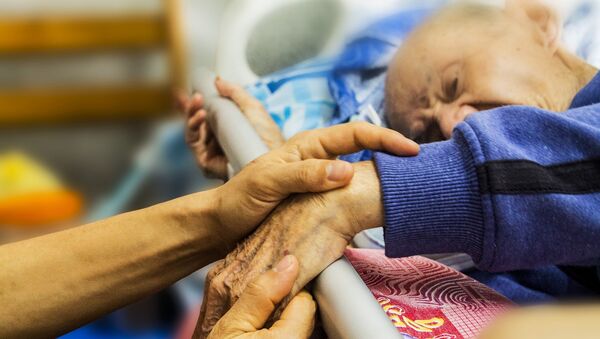Sputnik: Can you compare the situation back in the 1970s with hospices and palliative care to what we're seeing now? Not many people know even now what it is all about.
Dr. Robert Twycross: Palliative care, sometimes called hospice care, is care for those people who are coming towards the end of their life. They've got conditions that can no longer be cured. But because they can no longer be cured that doesn't mean that there are not many things which can be done in terms of care and support. So medicine generally is concerned about the quantity of life, extending your life, but palliative care we know it cannot be extended so we're focused on quality, quality of life for the patient, quality of life for the family. So obviously we're concerned about the relief of pain and other distressing symptoms which many people get at the end of life, but it's more than that because we're more than physical beings. And we talk about holistic or whole person care; we address not only the physical but also the psychological, the social and the spiritual issues which a person has to face in this situation.
READ MORE: 'New Weapon': UK PM May Set to Announce Large Investment in AI to Fight Cancer
Sputnik: What kind of expert does it take to combine all this knowledge and to work with these people? Does it have to be a separate field in medical colleges? How do you teach that?
Dr. Robert Twycross: It's both separate and the same. The point is - most doctors are trained to look at the illness and to cure a physical illness. The psychiatrists are working with the mind. And to move from seeking to cure, seeking to prolong life to supporting people through their dying months requires a totally different mentality. Some people can combine both the curative the palliative at the end of life, but it's difficult and particularly for patients who are suffering perhaps problem symptoms or have very difficult social circumstances you do need specialists' support.
Specialists' support needs to be as far as possible in the home but you need backup clinics, you need backup in patient's beds. There's need for specialist input but you're quite right when we talk about holistic care body, mind, family and spiritual/existential matters then yes, even doctors perhaps cannot always encompass the whole spectrum. That's why we talk about palliative care as delivered by a multi-disciplinary team. We'd always think in terms of a doctor and a nurse, and, we hope, a social worker, perhaps, other healthcare professionals, physiotherapy and so on, spiritual care and so on. But basically it's a team; it's not just one person.
READ MORE: US Envoy to UK: London Should Spend More on F-35s, Less on Healthcare, Education
Sputnik: You probably know the situation around the world and in Europe. Are there any countries that have good examples of this complex work being done properly or more completely, more in a kind of serious way?
Dr. Robert Twycross: Palliative care is recognized by the World Health Organization as one of the five key priorities. One of the measures of a civilized society is how well it looks after the destitute, the disabled and the dying. So palliative care is essential, millions of people are dying every year. I think if you take a world view it's 60 million and most of those would benefit from palliative care.
So, who's taking it seriously? I think more and more countries are. We're fortunate in the United Kingdom, palliative care started, if you like with, one key champion Dr. Cicely Saunders. And okay, when did she begin? Well, we tend to say in 1967, so we're what 51 years old. There were precursors to that and then I came alongside Cicely Saunders in the early 1970s and certainly, from the mid-1970s we saw exponential growth and in 1987 palliative medicine, the medical component of palliative care, became a recognized specialty. And we have specialist centers, hospices, palliative care units, we have a whole range of palliative care support and of course inevitably you have to concentrate on home care because that makes sense from the person's point of view, the family's point of view and, in fact, the financial point of view.
READ MORE: Blow to UK Home Office After Immigrant NHS Data Share Deal Shut Down
Home care is going to be cheaper than hospital care, but we're not concerned about cheapness as such, though the Ministry of Health will be. We're concerned about relieving suffering at the end of life, enhancing people's quality of life and supporting the family and the patient as they make a very difficult adjustment from hoping to live longer to recognizing that they are having to let go progressively, a major psychological turnaround.
The views and opinions expressed by Dr. Robert Twycross are those of the expert and do not necessarily reflect those of Sputnik.



